Abstract
Angiotensin-converting enzyme (ACE) and enkephalinase, two cell surface metallopeptidases, are responsible for angiotensin II formation and atrial natriuretic factor (ANF) degradation, respectively, and thereby play a critical role in the metabolism of hormonal peptides exerting essentially opposite actions in cardiovascular regulations. To affect simultaneously both hormonal systems by a single molecular structure, we have designed glycoprilat and alatrioprilat [(S)-N-[3-(3,4-methylene-dioxyphenyl)-2-(mercaptomethyl)-1-oxoprop yl] glycine and -alanine, respectively]. In vitro the two compounds inhibit both ACE and enkephalinase activities with similar, nanomolar potencies, and in vivo, glycopril and alatriopril, the corresponding diester prodrugs, occupy the two enzyme molecules in lung at similar low dosages (0.2-0.5 mg/kg of body weight, per os). The high potency of these compounds is attributable to interaction of the methylenedioxy group with the S1 subsite of ACE and of the aromatic ring with the S1' subsite of enkephalinase. In rodents, low doses of these mixed inhibitors exert typical actions of ACE inhibitors--i.e., prevention of angiotensin I-induced hypertension--as well as of enkephalinase inhibitors--i.e., protection from 125I-ANF degradation or enhancement of diuresis and natriuresis following acute extracellular volume expansion. In view of the known counterbalanced physiological actions of the two hormonal peptides, whose metabolism is controlled by ACE and enkephalinase, mixed inhibitors of the two peptidases show promise for the treatment of various cardiovascular and salt-retention disorders.
Full text
PDF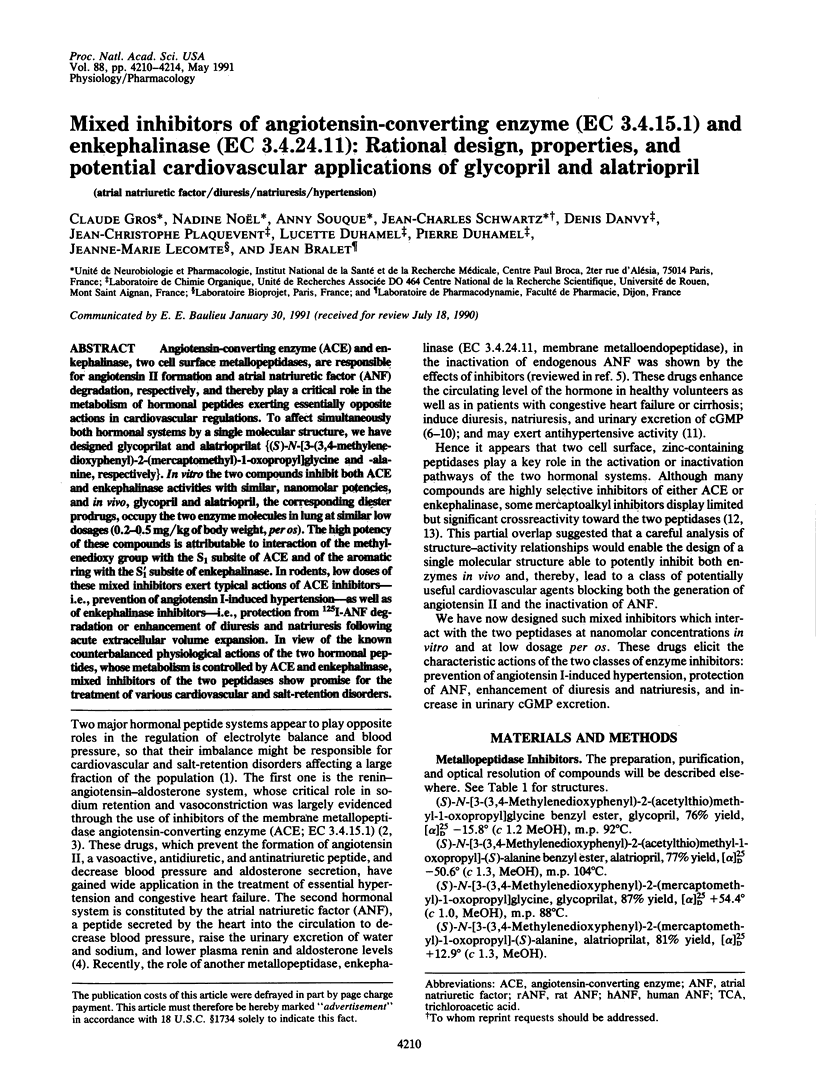
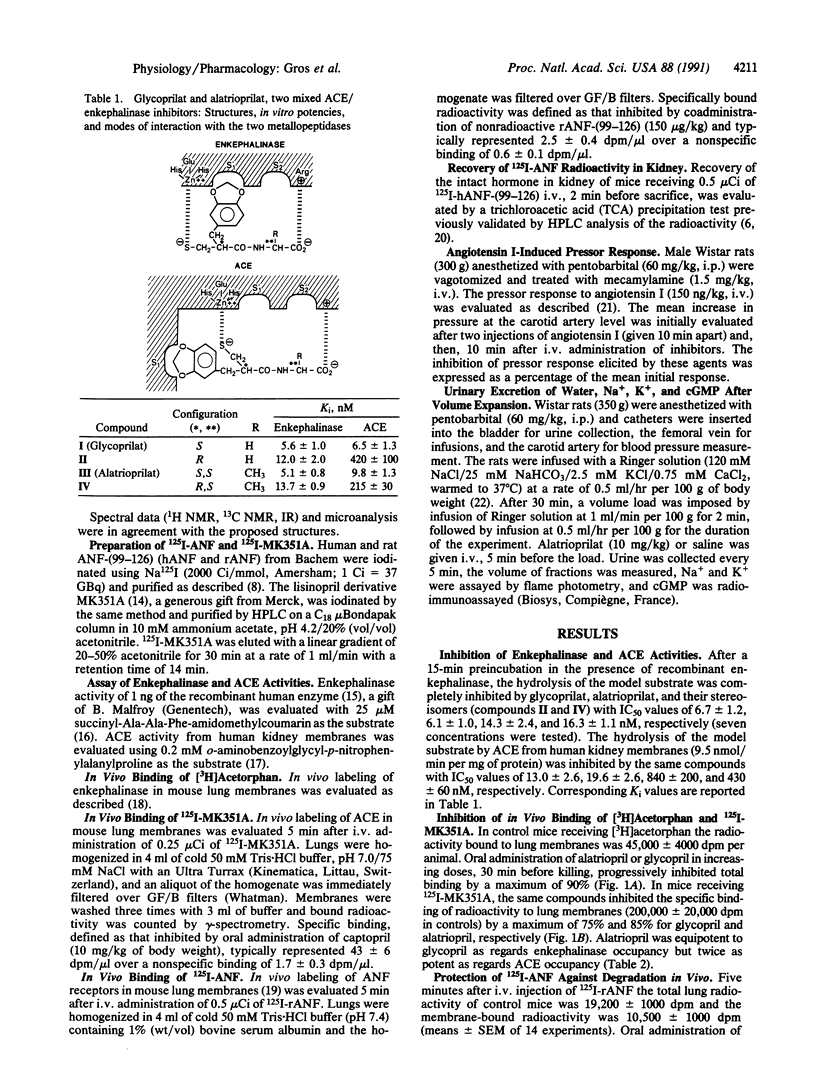
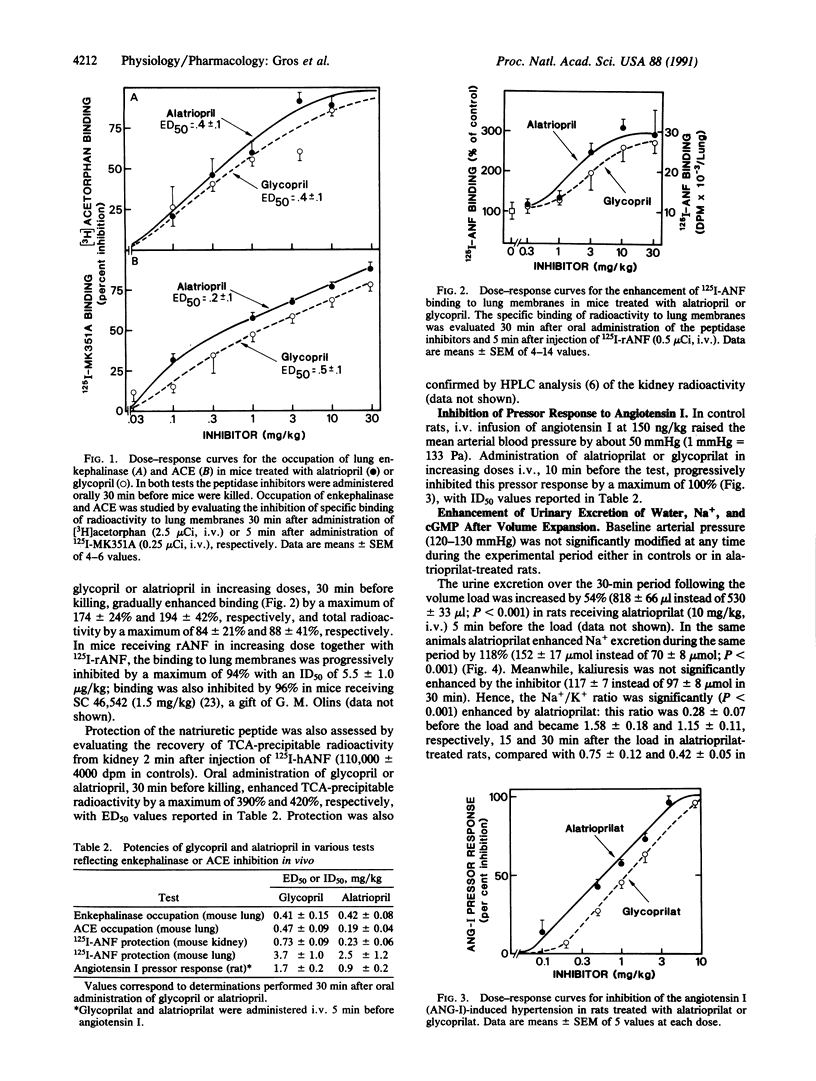
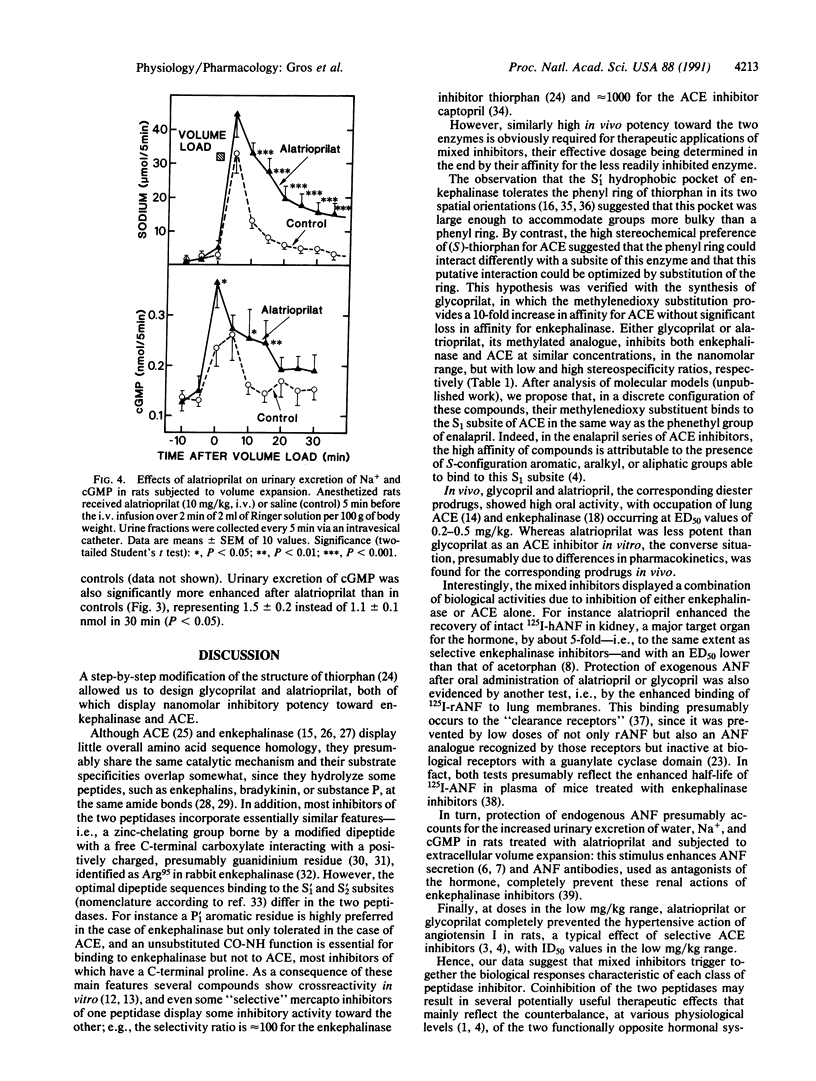
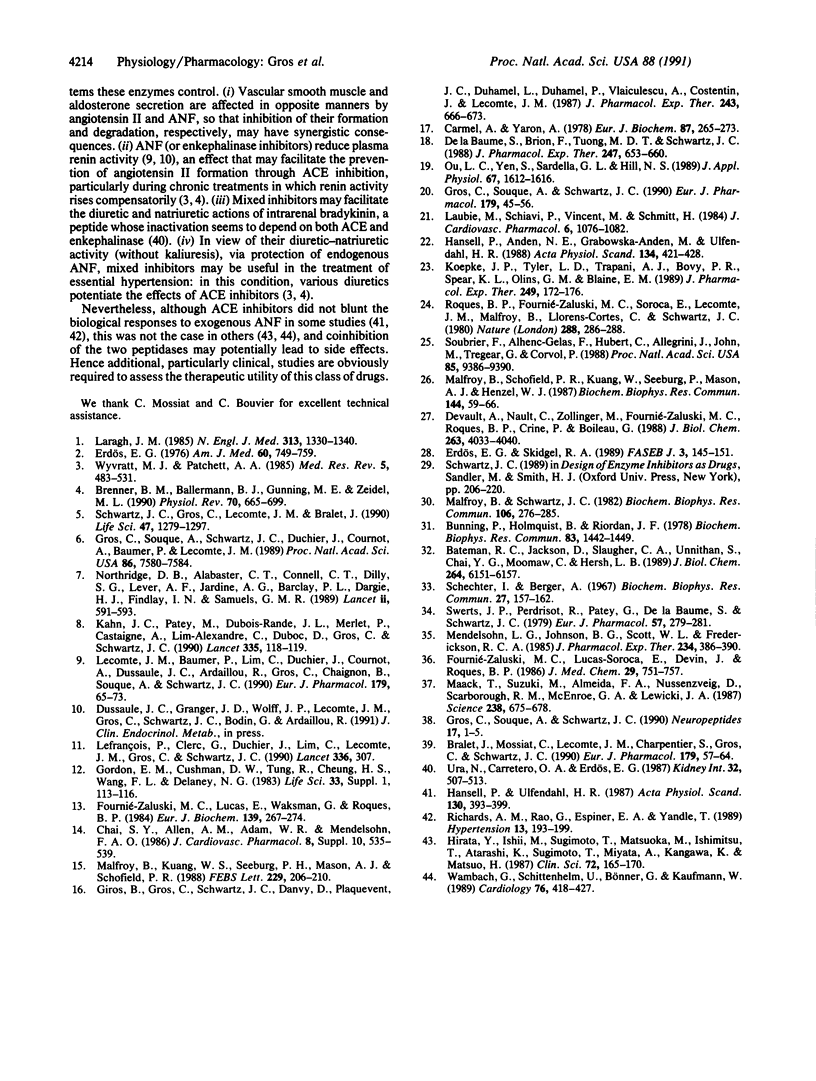
Selected References
These references are in PubMed. This may not be the complete list of references from this article.
- Bateman R. C., Jr, Jackson D., Slaughter C. A., Unnithan S., Chai Y. G., Moomaw C., Hersh L. B. Identification of the active-site arginine in rat neutral endopeptidase 24.11 (enkephalinase) as arginine 102 and analysis of a glutamine 102 mutant. J Biol Chem. 1989 Apr 15;264(11):6151–6157. [PubMed] [Google Scholar]
- Bralet J., Mossiat C., Lecomte J. M., Charpentier S., Gros C., Schwartz J. C. Diuretic and natriuretic responses in rats treated with enkephalinase inhibitors. Eur J Pharmacol. 1990 Apr 10;179(1-2):57–64. doi: 10.1016/0014-2999(90)90401-q. [DOI] [PubMed] [Google Scholar]
- Brenner B. M., Ballermann B. J., Gunning M. E., Zeidel M. L. Diverse biological actions of atrial natriuretic peptide. Physiol Rev. 1990 Jul;70(3):665–699. doi: 10.1152/physrev.1990.70.3.665. [DOI] [PubMed] [Google Scholar]
- Bünning P., Holmquist B., Riordan J. F. Functional residues at the active site of angiotensin converting enzyme. Biochem Biophys Res Commun. 1978 Aug 29;83(4):1442–1449. doi: 10.1016/0006-291x(78)91382-7. [DOI] [PubMed] [Google Scholar]
- Carmel A., Yaron A. An intramolecularly quenched fluorescent tripeptide as a fluorogenic substrate of angiotensin-I-converting enzyme and of bacterial dipeptidyl carboxypeptidase. Eur J Biochem. 1978 Jun 15;87(2):265–273. doi: 10.1111/j.1432-1033.1978.tb12375.x. [DOI] [PubMed] [Google Scholar]
- De la Baume S., Brion F., Dam Trung Tuong M., Schwartz J. C. Evaluation of enkephalinase inhibition in the living mouse, using [3H]acetorphan as a probe. J Pharmacol Exp Ther. 1988 Nov;247(2):653–660. [PubMed] [Google Scholar]
- Devault A., Nault C., Zollinger M., Fournie-Zaluski M. C., Roques B. P., Crine P., Boileau G. Expression of neutral endopeptidase (enkephalinase) in heterologous COS-1 cells. Characterization of the recombinant enzyme and evidence for a glutamic acid residue at the active site. J Biol Chem. 1988 Mar 15;263(8):4033–4040. [PubMed] [Google Scholar]
- Erdös E. G. Conversion of angiotensin I to angiotensin II. Am J Med. 1976 May 31;60(6):749–759. doi: 10.1016/0002-9343(76)90889-5. [DOI] [PubMed] [Google Scholar]
- Erdös E. G., Skidgel R. A. Neutral endopeptidase 24.11 (enkephalinase) and related regulators of peptide hormones. FASEB J. 1989 Feb;3(2):145–151. [PubMed] [Google Scholar]
- Fournie-Zaluski M. C., Lucas E., Waksman G., Roques B. P. Differences in the structural requirements for selective interaction with neutral metalloendopeptidase (enkephalinase) or angiotensin-converting enzyme. Molecular investigation by use of new thiol inhibitors. Eur J Biochem. 1984 Mar 1;139(2):267–274. doi: 10.1111/j.1432-1033.1984.tb08003.x. [DOI] [PubMed] [Google Scholar]
- Fournié-Zaluski M. C., Lucas-Soroca E., Devin J., Roques B. P. 1H NMR configurational correlation for retro-inverso dipeptides: application to the determination of the absolute configuration of "enkephalinase" inhibitors. Relationships between stereochemistry and enzyme recognition. J Med Chem. 1986 May;29(5):751–757. doi: 10.1021/jm00155a027. [DOI] [PubMed] [Google Scholar]
- Giros B., Gros C., Schwartz J. C., Danvy D., Plaquevent J. C., Duhamel L., Duhamel P., Vlaiculescu A., Costentin J., Lecomte J. M. Enantiomers of thiorphan and acetorphan: correlation between enkephalinase inhibition, protection of endogenous enkephalins and behavioral effects. J Pharmacol Exp Ther. 1987 Nov;243(2):666–673. [PubMed] [Google Scholar]
- Gordon E. M., Cushman D. W., Tung R., Cheung H. S., Wang F. L., Delaney N. G. Rat brain enkephalinase: characterization of the active site using mercaptopropanoyl amino acid inhibitors, and comparison with angiotensin-converting enzyme. Life Sci. 1983;33 (Suppl 1):113–116. doi: 10.1016/0024-3205(83)90457-5. [DOI] [PubMed] [Google Scholar]
- Gros C., Souque A., Schwartz J. C. Degradation of atrial natriuretic factor in mouse blood in vitro and in vivo: role of enkephalinase (EC 3.4.24.11). Neuropeptides. 1990 Sep;17(1):1–5. doi: 10.1016/0143-4179(90)90133-j. [DOI] [PubMed] [Google Scholar]
- Gros C., Souque A., Schwartz J. C., Duchier J., Cournot A., Baumer P., Lecomte J. M. Protection of atrial natriuretic factor against degradation: diuretic and natriuretic responses after in vivo inhibition of enkephalinase (EC 3.4.24.11) by acetorphan. Proc Natl Acad Sci U S A. 1989 Oct;86(19):7580–7584. doi: 10.1073/pnas.86.19.7580. [DOI] [PMC free article] [PubMed] [Google Scholar]
- Gros C., Souque A., Schwartz J. C. Inactivation of atrial natriuretic factor in mice in vivo: crucial role of enkephalinase (EC 3.4.24.11). Eur J Pharmacol. 1990 Apr 10;179(1-2):45–56. doi: 10.1016/0014-2999(90)90400-z. [DOI] [PubMed] [Google Scholar]
- Hansell P., Ande'n N. E., Grabowska-Ande'n M., Ulfendahl H. R. Atrial natriuretic factor, urinary catechol compounds and electrolyte excretion in rats during normal hydration and isotonic volume expansion. Influence of dopamine receptor blockade. Acta Physiol Scand. 1988 Nov;134(3):421–428. doi: 10.1111/j.1748-1716.1988.tb08510.x. [DOI] [PubMed] [Google Scholar]
- Hansell P., Ulfendahl H. R. Effects of atrial natriuretic peptide (ANP) during converting enzyme inhibition. Acta Physiol Scand. 1987 Jul;130(3):393–399. doi: 10.1111/j.1748-1716.1987.tb08154.x. [DOI] [PubMed] [Google Scholar]
- Hirata Y., Ishii M., Sugimoto T., Matsuoka H., Ishimitsu T., Atarashi K., Sugimoto T., Miyata A., Kangawa K., Matsuo H. Relationship between the renin-aldosterone system and atrial natriuretic polypeptide in rats. Clin Sci (Lond) 1987 Feb;72(2):165–170. doi: 10.1042/cs0720165. [DOI] [PubMed] [Google Scholar]
- Kahn J. C., Patey M., Dubois-Rande J. L., Merlet P., Castaigne A., Lim-Alexandre C., Lecomte J. M., Duboc D., Gros C., Schwartz J. C. Effect of sinorphan on plasma atrial natriuretic factor in congestive heart failure. Lancet. 1990 Jan 13;335(8681):118–119. doi: 10.1016/0140-6736(90)90595-v. [DOI] [PubMed] [Google Scholar]
- Koepke J. P., Tyler L. D., Trapani A. J., Bovy P. R., Spear K. L., Olins G. M., Blaine E. H. Interaction of non-guanylate cyclase-linked atriopeptin receptor ligand and endopeptidase inhibitor in conscious rats. J Pharmacol Exp Ther. 1989 Apr;249(1):172–176. [PubMed] [Google Scholar]
- Laragh J. H. Atrial natriuretic hormone, the renin-aldosterone axis, and blood pressure-electrolyte homeostasis. N Engl J Med. 1985 Nov 21;313(21):1330–1340. doi: 10.1056/NEJM198511213132106. [DOI] [PubMed] [Google Scholar]
- Laubie M., Schiavi P., Vincent M., Schmitt H. Inhibition of angiotensin I-converting enzyme with S 9490: biochemical effects, interspecies differences, and role of sodium diet in hemodynamic effects. J Cardiovasc Pharmacol. 1984 Nov-Dec;6(6):1076–1082. [PubMed] [Google Scholar]
- Lecomte J. M., Baumer P., Lim C., Duchier J., Cournot A., Dussaule J. C., Ardaillou R., Gros C., Chaignon B., Souque A. Stereoselective protection of exogenous and endogenous atrial natriuretic factor by enkephalinase inhibitors in mice and humans. Eur J Pharmacol. 1990 Apr 10;179(1-2):65–73. doi: 10.1016/0014-2999(90)90402-r. [DOI] [PubMed] [Google Scholar]
- Lefrançois P., Clerc G., Duchier J., Lim C., Lecomte J. M., Gros C., Schwartz J. C. Antihypertensive activity of sinorphan. Lancet. 1990 Aug 4;336(8710):307–308. doi: 10.1016/0140-6736(90)91837-z. [DOI] [PubMed] [Google Scholar]
- Maack T., Suzuki M., Almeida F. A., Nussenzveig D., Scarborough R. M., McEnroe G. A., Lewicki J. A. Physiological role of silent receptors of atrial natriuretic factor. Science. 1987 Oct 30;238(4827):675–678. doi: 10.1126/science.2823385. [DOI] [PubMed] [Google Scholar]
- Malfroy B., Kuang W. J., Seeburg P. H., Mason A. J., Schofield P. R. Molecular cloning and amino acid sequence of human enkephalinase (neutral endopeptidase). FEBS Lett. 1988 Feb 29;229(1):206–210. doi: 10.1016/0014-5793(88)80828-7. [DOI] [PubMed] [Google Scholar]
- Malfroy B., Schofield P. R., Kuang W. J., Seeburg P. H., Mason A. J., Henzel W. J. Molecular cloning and amino acid sequence of rat enkephalinase. Biochem Biophys Res Commun. 1987 Apr 14;144(1):59–66. doi: 10.1016/s0006-291x(87)80475-8. [DOI] [PubMed] [Google Scholar]
- Malfroy B., Schwartz J. C. Properties of "enkephalinase" from rat kidney: comparison of dipeptidyl-carboxypeptidase and endopeptidase activities. Biochem Biophys Res Commun. 1982 May 31;106(2):276–285. doi: 10.1016/0006-291x(82)91106-8. [DOI] [PubMed] [Google Scholar]
- Mendelsohn L. G., Johnson B. G., Scott W. L., Frederickson R. C. Thiorphan and analogs: lack of correlation between potency to inhibit "enkephalinase A" in vitro and analgesic potency in vivo. J Pharmacol Exp Ther. 1985 Aug;234(2):386–390. [PubMed] [Google Scholar]
- Northridge D. B., Jardine A. G., Alabaster C. T., Barclay P. L., Connell J. M., Dargie H. J., Dilly S. G., Findlay I. N., Lever A. F., Samuels G. M. Effects of UK 69 578: a novel atriopeptidase inhibitor. Lancet. 1989 Sep 9;2(8663):591–593. doi: 10.1016/s0140-6736(89)90714-9. [DOI] [PubMed] [Google Scholar]
- Ou L. C., Yen S., Sardella G. L., Hill N. S. Does atrial natriuretic factor protect against right ventricular overload? II. Tissue binding. J Appl Physiol (1985) 1989 Oct;67(4):1612–1616. doi: 10.1152/jappl.1989.67.4.1612. [DOI] [PubMed] [Google Scholar]
- Richards A. M., Rao G., Espiner E. A., Yandle T. Interaction of angiotensin converting enzyme inhibition and atrial natriuretic factor. Hypertension. 1989 Mar;13(3):193–199. doi: 10.1161/01.hyp.13.3.193. [DOI] [PubMed] [Google Scholar]
- Roques B. P., Fournié-Zaluski M. C., Soroca E., Lecomte J. M., Malfroy B., Llorens C., Schwartz J. C. The enkephalinase inhibitor thiorphan shows antinociceptive activity in mice. Nature. 1980 Nov 20;288(5788):286–288. doi: 10.1038/288286a0. [DOI] [PubMed] [Google Scholar]
- Schechter I., Berger A. On the size of the active site in proteases. I. Papain. Biochem Biophys Res Commun. 1967 Apr 20;27(2):157–162. doi: 10.1016/s0006-291x(67)80055-x. [DOI] [PubMed] [Google Scholar]
- Schwartz J. C., Gros C., Lecomte J. M., Bralet J. Enkephalinase (EC 3.4.24.11) inhibitors: protection of endogenous ANF against inactivation and potential therapeutic applications. Life Sci. 1990;47(15):1279–1297. doi: 10.1016/0024-3205(90)90192-t. [DOI] [PubMed] [Google Scholar]
- Soubrier F., Alhenc-Gelas F., Hubert C., Allegrini J., John M., Tregear G., Corvol P. Two putative active centers in human angiotensin I-converting enzyme revealed by molecular cloning. Proc Natl Acad Sci U S A. 1988 Dec;85(24):9386–9390. doi: 10.1073/pnas.85.24.9386. [DOI] [PMC free article] [PubMed] [Google Scholar]
- Swerts J. P., Perdrisot R., Patey G., De La Baume S., Schwartz J. C. 'Enkephalinase' is distinct from brain 'angiotensin-converting enzyme'. Eur J Pharmacol. 1979 Aug 1;57(2-3):279–281. doi: 10.1016/0014-2999(79)90380-7. [DOI] [PubMed] [Google Scholar]
- Ura N., Carretero O. A., Erdös E. G. Role of renal endopeptidase 24.11 in kinin metabolism in vitro and in vivo. Kidney Int. 1987 Oct;32(4):507–513. doi: 10.1038/ki.1987.239. [DOI] [PubMed] [Google Scholar]
- Wambach G., Schittenhelm U., Bönner G., Kaufmann W. Renal and adrenal resistance against atrial natriuretic peptide in congestive heart failure: effect of angiotensin I-converting-enzyme inhibition. Cardiology. 1989;76(6):418–427. doi: 10.1159/000174528. [DOI] [PubMed] [Google Scholar]
- Wyvratt M. J., Patchett A. A. Recent developments in the design of angiotensin-converting enzyme inhibitors. Med Res Rev. 1985 Oct-Dec;5(4):483–531. doi: 10.1002/med.2610050405. [DOI] [PubMed] [Google Scholar]


